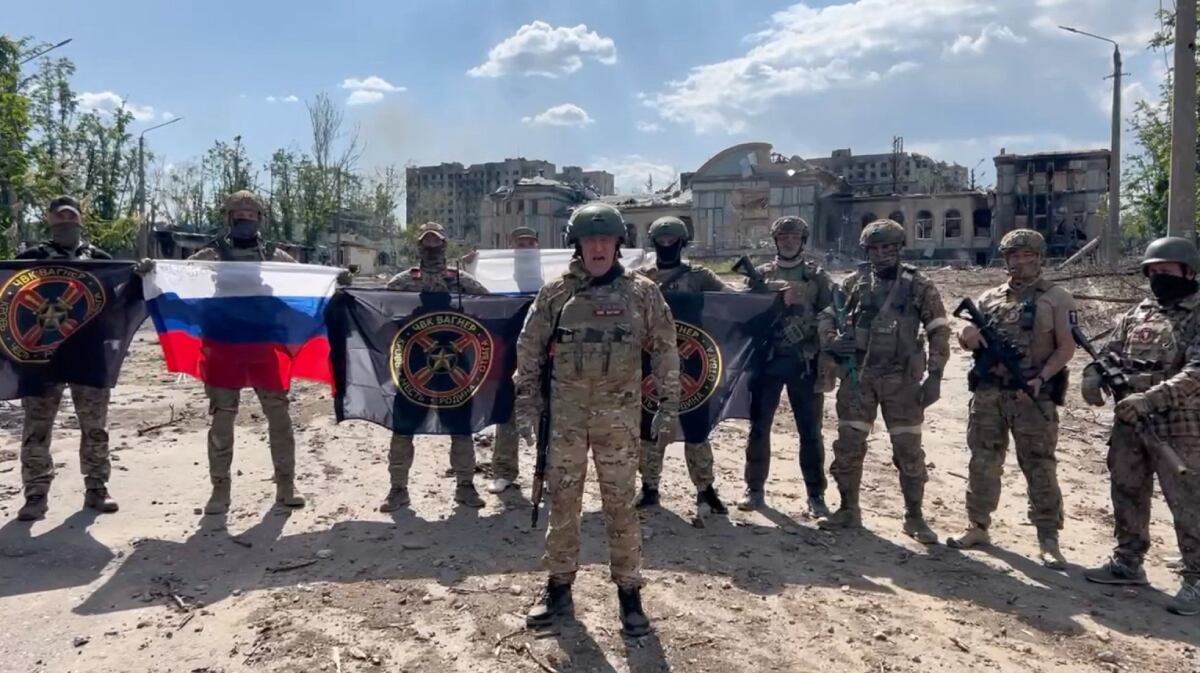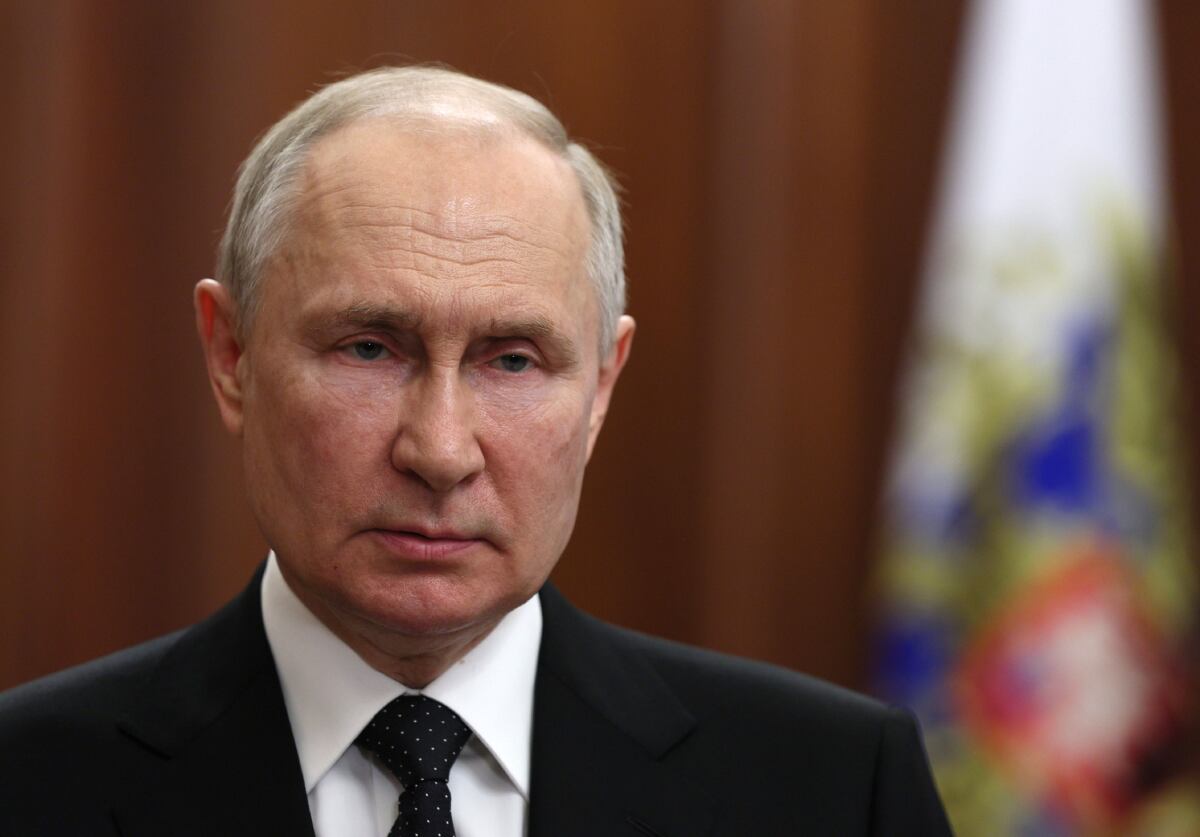They have been known for the brutality of the methods they employ. And for the Ukrainian army they have been a fearsome enemy.
Despite this, the participation of the wagner group in the Russian war against the Ukraine seems to be coming to an end.
LOOK: What is the Wagner Group, the Russian mercenary corps in Ukraine (and how it operates)
Last Saturday, the leader of this “private military company,” Yevgeny Prigozhinlaunched an unusual armed march from Ukraine to Moscow that was described by President Vladimir Putin as a “betrayal”, “a stab in the back”
After an agreement mediated by the President of Belarus, Alexander Lukashenko, Prigozhin made his forces return that same Saturday before arriving in the Russian capital and this Monday he insisted on pointing out that this mobilization was not a coup attempt but a “protest”. .
“The aim of the march was to prevent the destruction of Wagner and hold officials to account who, through their unprofessional actions, have made a large number of mistakes,” he said in a veiled reference to Russian military chiefs in an audio message broadcast on Telegram.
However, it does not appear that there will continue to be a role for the Wagner Group either in Russia or in its war against Ukraine.
This Monday, Putin announced that he will honor the agreement reached with Lukashenko so that those members of Wagner who have not shed blood in Saturday’s actions will be able to sign a contract with the Ministry of Defense or move to Belarus.
But how will this affect Russia’s war against Ukraine in practice?
“I don’t think it’s going to have that big of an impact on the Ukraine war, at least in the short term,” says Matthew Orr, a Eurasia analyst at Rane, a risk analysis firm.
“The Wagner forces that participated in these events had already been withdrawn from the front lines and, in fact, even those that did not participate were not at the front lines in Ukraine either, but mostly in their rear camps. So it’s not like Russia will lose a bunch of forces that it would want to use in the Ukraine war or could use in the Ukraine war in the future,” he adds.
Zach Witlin, principal analyst at consultancy Eurasia Group, also does not expect these events to have a major impact on the war, at least in the coming weeks or months.
It emphasizes that Wagner’s forces were not deployed in the areas where Ukraine is developing its counteroffensivemuch further south of the country.
A declining force

Analysts point out that the Wagner Group played a prominent role in the war in 2022, especially in the battle for control of the town of Bakhmut, but its importance has since waned.
“The value of the Wagner Group has been decreasing over the last year. They were used for the most risky missions and were in the front line of combat absorbing casualties. From that point of view, they have been useful to the Russian military,” says Witlin.
The heavy losses suffered by the Wagner group in leading operations in Bakhmut have been, according to Matthew Orr, one of the elements that has led to its decline.
“Many of its units, and specifically those made up of prisoners [que habían sido liberados a cambio en alistarse] they were involved in many very risky and dangerous attacks. And they had a lot of wear and tear during that time. That is the main reason for its decline. Ultimately, of course, they don’t have the same resources to compete with the regular Russian army,” he notes.
He adds that to this material and human loss is added the fact that Prigozhin began making strong political statements questioning Russian military leaders.in particular, the Minister of Defense, Sergei Shoigu, and the Chief of the General Staff, Valery Gerasimov.
That clash between the leader of the Wagner Group and the Russian military chiefs came to a breaking point on June 10, when it was announced that the volunteer soldiers [como los mercenarios de Wagner] Those who were fighting in Ukraine would have to sign a contract with the Russian Defense Ministry, which in effect meant that these fighters would be subject to Moscow and not Prigozhin.
This initiative, which days later received public support from Putin, would have triggered the mutiny of the founder of this private army.
In any case, Witlin points out that Wagner’s mercenaries – estimated at fewer than 20,000 men – represent a small percentage of Russia’s total military forcesso while their recruitment by the MoD may make a small contribution, it doesn’t make a major difference.
An opportunity for Ukraine

But what about Ukraine? Could the conflict within the Russian forces be an opportunity to boost their counteroffensive?
“Ukraine may have an incentive to act during this time of confusion”, says Zach Witlin to BBC Mundo, noting that this is the type of situation that is expected to be pending, since it has a military offensive underway.
For his part, the US Secretary of State, Anthony Blinken, said this weekend that this situation in Russia could favor Kyiv.
“To the extent that the Russians are distracted and divided, it may make it more difficult for them to continue their aggression against Ukraine,” he said.
However, there was no cessation of Russian attacks against Ukraine over the weekend and, according to US officials and analysts consulted by The New York Times, Ukrainian forces do not appear to have yet detected any immediate gaps in Russian defenses to take advantage of.
And what about Russia? Is it possible that Putin decides to launch a major offensive to show his strength after this crisis as some analysts have suggested?
“That’s a possibility,” says Witlin. “Of course, we don’t have a window to see what Putin is thinking right now, so it’s very hard to know for sure if it’s something he’s considering.”
“Over the last six months, Russia has been bombing some of the infrastructure across the country, not just on the battlefield, and there have been times when it seemed like it was launching a larger number of strikes in Ukraine to send a message. ”, he adds.
It indicates that other possible responses from Moscow about which there are questions are the use of tactical nuclear weapons or sabotage of Ukraine’s nuclear plants.
“The answer to that is that they are all possible, but we don’t think they are the most likely, although it is fair to say that now they may have a higher probability, but I don’t think they are the options that make the most sense,” he added.
For Matthew Orr, what happened with the Wagner Group does not change Russia’s fundamental calculations in Ukraine.
“This is going to have a relatively minor effect on their ability to continue the war. Putin is caught up in this war and has to go along with it at all costs.. For him, all those dynamics remain the same. So he will stay engaged. And Russia maintains the ability to move forward, ”he concludes.
Despite everything, there are analysts who wonder what impact what happened this weekend will have on Russian public opinion and on the support that Putin has in the military.
Angel Bermudez (@angelbermudez)
BBC News World
Source: Elcomercio
I am Jack Morton and I work in 24 News Recorder. I mostly cover world news and I have also authored 24 news recorder. I find this work highly interesting and it allows me to keep up with current events happening around the world.

:quality(75)/cloudfront-us-east-1.images.arcpublishing.com/elcomercio/34ZEO7LJTBFP7CCJJ56BS3V334.png)

:quality(75)/cloudfront-us-east-1.images.arcpublishing.com/elcomercio/Z7OEUU4X55EFRPVVUSSIQ4LAN4.jpg)
:quality(75)/cloudfront-us-east-1.images.arcpublishing.com/elcomercio/I7RTEOSUTNDDXN4WWB3YCINMGU.jpg)
:quality(75)/cloudfront-us-east-1.images.arcpublishing.com/elcomercio/COZWC2CYCVDHHP6WJYU3C64OVQ.jpg)
:quality(75)/cloudfront-us-east-1.images.arcpublishing.com/elcomercio/2JXAFYCGCVEFJB7YIGWKSC3YRI.jpg)
